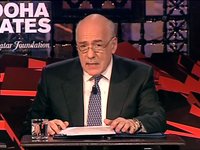This House believes for the sake of democracy Egypt should postpone elections
Monday March 14 2011
AUC Tahrir Square Campus, Cairo, Egypt
MOTION PASSED
by 84% to 16%
Transcript
Order of speeches
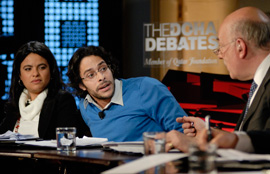
- Introduction
- Marwa Sharafeldin
- Esam el Erian
- Shaheer George
- Sherif Taher
- Audience questions
- Vote result
Introduction
 TIM SEBASTIAN
TIM SEBASTIAN
Ladies and gentlemen, a very good evening to you from Cairo. We're at the American University Campus just a few steps from Tahrir Square, the epicentre of the protests that overthrew the Mubarak regime only a month ago. On behalf of The Doha Debates sponsored by the Qatar Foundation, we're delighted to be here at this extraordinary moment in Egypt's history. Well, tonight the country remains under military rule with the same state of emergency as it's endured for decades. The army has promised free elections, both parliamentary and presidential later this year, but is that in the best interests of democracy? Would it be better to give more time to emerging personalities and parties to compete fairly in a new political environment, or is it best to seize the revolutionary momentum, bring in transition leaders as fast as possible, and take politics off the streets and put it back into a parliament? The answers to that may well help determine where the revolution goes from here, hence our motion tonight "This House believes for the sake of democracy Egypt should postpone elections." Our panel is as always deeply divided. Speaking for the motion, Marwa Sharafeldin, a rights campaigner who took part in the daily protest during the revolution.  She's currently studying for her PhD in Law at Oxford University. And with her, Shaheer George. He too was involved in the revolution, has political ambitions of his own and has been active in pro-democracy groups including the National Association of Change, and Kefaya. Against the motion, Essam El-Erian a senior member and spokesman of the Muslim Brotherhood. Under the Mubarak regime, he's had several spells in prison for his political views. And Sharif Taher an IT and management professional turned politician. He belongs to the Al Wafd party, the largest liberal grouping in Egypt and he serves on its supreme commission. Ladies and gentlemen, our panel. So now let me ask Marwa Sharafeldin to speak for the motion, please.
She's currently studying for her PhD in Law at Oxford University. And with her, Shaheer George. He too was involved in the revolution, has political ambitions of his own and has been active in pro-democracy groups including the National Association of Change, and Kefaya. Against the motion, Essam El-Erian a senior member and spokesman of the Muslim Brotherhood. Under the Mubarak regime, he's had several spells in prison for his political views. And Sharif Taher an IT and management professional turned politician. He belongs to the Al Wafd party, the largest liberal grouping in Egypt and he serves on its supreme commission. Ladies and gentlemen, our panel. So now let me ask Marwa Sharafeldin to speak for the motion, please.
Marwa Sharafeldin
Speaking for the motion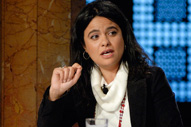
MARWA SHARAFELDIN
Ladies and gentlemen, we have to postpone elections for the sake of democracy and stability. Elections alone are not democracy. They are the final step in the process. We have had numerous elections over the years, has it brought democracy to us? The answer is a clear no. This was not only because we had a dictatorial regime manipulating elections but more importantly because we lacked the very institutional base and infrastructure that any democratic country should have before it holds any meaningful elections. It is this foundation that we are in dire need of building now, namely a new constitution, not a dead one, that guarantees basic personal political and human rights, real diversity of representation through freedom of association and speech, the rule of law and meaningful limits and separation of powers. May I ask you, how will be able to hold elections without a constitution that clearly outlines these necessities? When you hold either parliamentary or presidential elections, what mechanism will we have in place to regulate and hold these elected bodies accountable if we don't have a real constitution? How can elections be held when the state-run media, municipalities, and security apparatus are still prey to the remnants of the old regime? And finally which groups or parties are ready now to participate in these elections? Do they represent the silent majority who took to the streets in millions last January? Do they represent the silent majority? We know that the late regime created its own organised opposition, and it is these groups who are today ready to jump at the chance of early elections, knowing that they will have an advantage in an unequal playing field. To what benefit will these elections be held when security and thuggery on the street itself is a serious challenge. Shouldn't we first reconciliate the people with their police force before they suddenly meet together at the ballot boxes? Any elections that will take place without all the above might not be rigged in practice but I assure you, they will be rigged in spirit. Come and talk to us about stability then. We have several realistic scenarios that we can choose from that do not rush us towards meaningless elections.
TIM SEBASTIAN
Please wrap up shortly.
MARWA SHARAFELDIN
Scenarios that don't reduce this revolution merely to elections. We don't need more cosmetic changes. We need a new constitution that reflects this, an institutional infrastructure that respects this, and diverse political parties that perfects this. Thank you.
TIM SEBASTIAN
Marwa Sharafeldin, thank you very much indeed. You like military rule?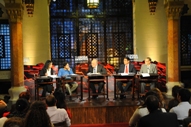 MARWA SHARAFELDIN
MARWA SHARAFELDIN
Do I like military rule?
TIM SEBASTIAN
Yes, you want to perpetuate it, you want it to continue.
MARWA SHARAFELDIN
I don't want to perpetuate military role.
TIM SEBASTIAN
Well, you don't want elections which would end it.
MARWA SHARAFELDIN
Do you think elections will end military rule?
TIM SEBASTIAN
Don't you?
MARWA SHARAFELDIN
I don't think that the ...
TIM SEBASTIAN
So you don't trust the military?
MARWA SHARAFELDIN Don't put words in my mouth. I did not say that.
Don't put words in my mouth. I did not say that.
TIM SEBASTIAN
I'm asking you, do you trust them or not?
MARWA SHARAFELDIN
The army?
TIM SEBASTIAN
Yes.
MARWA SHARAFELDIN
I don't think this is the question to ask at the moment. The question to ask is ...
TIM SEBASTIAN
Why don't you want to answer it?
MARWA SHARAFELDIN
Because I think it's not relevant to the motion.
TIM SEBASTIAN
I think it's very relevant. You want to continue with military rule. At the moment you have no constitution, you have no parliament ...
MARWA SHARAFELDIN
I did not say that, I did not say I wanted to continue with military rule.
TIM SEBASTIAN
Well, you don't want quick elections.
MARWA SHARAFELDIN
I said there are scenarios that do not include only military rule, that can take us through the interim period, that's what I said.
TIM SEBASTIAN
Such as, such as?
MARWA SHARAFELDIN
Such as having either an interim president or a presidential council.
TIM SEBASTIAN
But that's speculation. You haven't got any of those at the moment.
MARWA SHARAFELDIN
Yes we do.
TIM SEBASTIAN
If you walk outside this building tonight, you've got tanks and you've got military rule. Are you happy about that?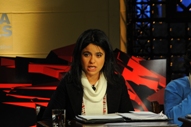 MARWA SHARAFELDIN
MARWA SHARAFELDIN
For now we have that, but what I am proposing here...
TIM SEBASTIAN
Are you happy about that? Military courts, military justice. A demonstrator has been sentenced to five years.
MARWA SHARAFELDIN
No, it cannot continue, obviously.
TIM SEBASTIAN
But you are voting for it to continue.
MARWA SHARAFELDIN
I am not. I am saying there are scenarios...
TIM SEBASTIAN
You're on the side which wants to delay the democratic process.
MARWA SHARAFELDIN
Are you going to let me speak today or not?
TIM SEBASTIAN
Trying to. I was trying to get you to answer something you didn't want to answer.
MARWA SHARAFELDIN
No, I'm telling you, no, military rule should not continue. We have scenarios for that not to happen in the interim period. The option is not between either election or military rule.
TIM SEBASTIAN
Who's agreed those scenarios?
MARWA SHARAFELDIN
You know actually what you're doing? You're doing exactly like the old regime. They're telling us it's either Mubarak or instability. Now you're telling me it's either elections or the military. [Audience applause]. Thank you, thank you.
TIM SEBASTIAN
Marwa Sharafeldin, thank you very much indeed. I'll come back to you. Could I please ask Essam El-Erian to speak against the motion.
Esam el Erian
Speaking against the motion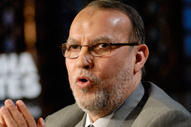
ESSAM EL-ERIAN
Now it is time to hand the power from the army military to the civilians. Delaying that is putting the country in a very critical situation. Egypt is surrounded by a civil war in the West, the splitting of Sudan in the South, the bigger loser in the East: Israel; and also militarily from Europe and the USA in the Mediterranean. The army wants to hand the power to the civilians through elections and of course the civilians must be ready because the Egyptians who in millions made this historical revolution cannot be described as not ready for democracy. They are ready for democracy and they are waiting for democracy for sixty years. For sixty years Egyptians have been living under dictatorship, and it is time now to be a democratic model for the whole region. Egyptian democracy is built by the Egyptians themselves, by their efforts. It is not a democracy coming on the tanks of the Americans or simulating from any other democracy in the West or East. Now, I think all excuses to delay elections are nonsense. Readiness is for all. We are struggling in this country for more than 30 years during the Mubarak regime. The people who are struggling and they were victims to this regime are ready. They can organise themselves, and we invite all political factions: all the Baathists, new Baathists, individuals, to have a national alliance, to help each other, to have a national list, to go to the elections united. It is not time for...
TIM SEBASTIAN
Could you please come to an end.
ESSAM EL-ERIAN
I think it is not time for competition now. It is time for unity, solidarity, to have a new democratic order for Egypt based on rotation in power, free and fair elections. The nation is a source of all authorities. A new constitution cannot be built without going to elections, because...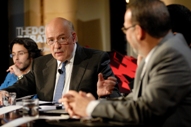 TIM SEBASTIAN
TIM SEBASTIAN
Okay, I must bring you to a close, Dr. El-Erian, thank you very much indeed, thank you. You say it's been sixty years of oppression, sixty years of dictatorship in Egypt. What's your hurry in going for elections now? Why not create a fair platform for new parties, new personalities to come on board? Everybody knows you are better organised than everybody else, so you want a quick election because you want a good number of seats, don't you?
ESSAM EL-ERIAN
We are giving a hand to all political factions, to be united. We are not targeting a majority...
TIM SEBASTIAN
So, you don't to win any seats at all in the parliament?
ESSAM EL-ERIAN
We are not targeting a majority now. We are satisfied to have 30 percent of the seats, and the rest of the seats, 70 percent are for competition, and I prefer that all political factions can be united together to overcome all obstacles in the incoming days.
TIM SEBASTIAN
How democratic are you, because you use some pretty inflammatory rhetoric don't you, your leader, your supreme guide Mohamed Badi, talks about jihad against Jews and Americans. Is that your official movement platform?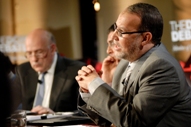 ESSAM EL-ERIAN
ESSAM EL-ERIAN
I think that is not the issue now.
TIM SEBASTIAN
No, but he does use that ...
ESSAM EL-ERIAN
Yes, you must remember we are talking about elections and democracy.
TIM SEBASTIAN
No we are talking about what your movement stands for. Could I just remind you...
ESSAM EL-ERIAN
We are not denying that we are calling for jihad but what is actually the nature of jihad? As we hear, there is small jihad and biggest jihad: small jihad is fighting in the armies; the biggest jihad is to be a democratic, a good nation...
TIM SEBASTIAN
I'll tell you what jihad you were calling for because what your supreme guide, as you call him, said in a sermon last year was: "Waging jihad against both of these infidels, America and Israel, is a commandment of Allah that cannot be disregarded." Is this the kind of movement that is ready to take its place in the democratic forum of a new Egypt, is it?
ESSAM EL-ERIAN
Look Tim, Americans would destroy a country like Afghanistan and want to give us a model of democracy...
TIM SEBASTIAN
Do you support this view?
ESSAM EL-ERIAN
Our jihad against America is against the attitude of America in this region. They've stolen their power. They put up money for this country...all was lost in corruption.
TIM SEBASTIAN
So you are an anti-American movement?
ESSAM EL-ERIAN
American policies. We are not anti-American people. We are anti American administration.
TIM SEBASTIAN
You just like a jihad against them? ESSAM EL-ERIAN
ESSAM EL-ERIAN
In Islamic terms...you must explain Islamic terms with Islamic knowledge, not by the extremists in the Western knowledge.
TIM SEBASTIAN
So you're for jihad, you stand by what your leaders said, you're for jihad against Americans and Jews?
ESSAM EL-ERIAN
Whoever built a democratic country in Egypt with the legend that Israel is the only democratic force in a field of dictatorship would be false, and I think Israel now is in a certainly critical situation, it must reduce itself.
TIM SEBASTIAN
Okay, Dr. Essam El-Erian, thank you very much indeed. Can I please ask Shaheer George now to speak against the motion, speak for the motion, I'm sorry.
Shaheer George
Speaking for the motion
SHAHEER GEORGE
Yes I'll speak for the motion and for the sake of time will only start with four reasons but I have plenty more to move forward with the discussion. Let's start first, how can democracy in elections happen without a pluralist environment? If we have the same actors who have been there for thirty years: Muslim Brotherhood, Wafd, and all these parties, are still the actors you are going for elections and we don't have a fair representation of other groups that represent the revolution, how can we claim that this is the kind of democracy that we want, especially if these are the forces who are going to draw up the new constitution in the new Egypt. Second of all, we're talking about the military. How do we want this process to be lead by the military? The military are the ones with the side of the road map for democracy, and this can never get a proper road map of democracy. If you want a true, real road map for democracy, let's look at Tunisia. Tunisia they did an institutionalised, national dialogue process, including all actors, and they have decided what's right for democracy. We cannot let the military alone decide what's the future step to have a strong democratic process, especially many unsettled issues for the elections and democracy. We haven't talked about international monitoring; we haven't talked about the right of Egyptians to vote abroad. How we want to do elections without sorting these issues? And finally how can we do three elections in four months? How can we do Shura, parliamentary and presidential election in three months and expect any good and fair chance for a candidate to present themselves? And finally how can a democratic revolution that asks to drop this constitution and we go into election under an undemocratic constitution that the people dropped and the military by signing power support, so how are we still trying to do elections under this miserable constitution? Any elections under this miserable constitution is a farce to democracy.
TIM SEBASTIAN
Shaheer George, thank you very much indeed If you delay elections you'll get exactly what you don't want, what you said you don't want, which is continuing military rule.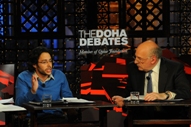 SHAHEER GEORGE
SHAHEER GEORGE
No. We are trapped in the mindset that our only solution is the constitution of 1971 and military rule.
TIM SEBASTIAN
But it's what you have at the moment, isn't it?
SHAHEER GEORGE
No, I think it's a matter of negotiations. We need to negotiate with the military on having the provincial council, provisional constitution and we need to negotiate what jurisdiction of this military council. Now the military is ruling with no jurisdiction, with no provisional constitution. We need the provisional constitution that limits the power of the military, that institutionalise national dialogue, and the alternatives are many, let's take an interim president for example...
TIM SEBASTIAN
And you think the military is going to sit around and let you take away its new power?
SHAHEER GEORGE
No, no. The military came to power because the revolution was in the street and I think the military wants to listen to their people, and I think they will listen if people voted no and they said that we want a proper road to democracy, the military will listen.
TIM SEBASTIAN
You think they'll listen? SHAHEER GEORGE
SHAHEER GEORGE
Yes, I think and I will work on it.
TIM SEBASTIAN
... trust them to listen. Never shown any inclination of capacity for democracy in the past.
SHAHEER GEORGE
They've listened so far that they need to listen more. They need constitutional amendments, people will say no. They know that their road map to democracy is not up to the expectations of the supporters of the revolution.
TIM SEBASTIAN
Shaheer George, if I can stop you for a moment, Shaheer George, they haven't listened. They haven't listened to your key demand, which is to lift the state of emergency. You've still got a state of emergency here. You want to continue with the state of emergency?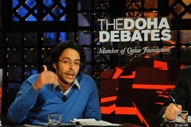 SHAHEER GEORGE
SHAHEER GEORGE
No, I don't want the military to continue, that's what I'm saying there are many alternatives, on top of them is a national dialogue to have a road for democracy. We cannot move into democracy without a national dialogue and with a decision taken solely by the military alone. We need a national dialogue, without this any discussion of democracy is a farce and it's only the impression and the mindset of the military...
TIM SEBASTIAN
... and you're prepared, excuse me, excuse me, and you're prepared to lose the momentum of the revolution.
SHAHEER GEORGE
I don't think it would be lost. Momentum will happen when forces, political organisations...the momentum will be lost if there is no political revolution in those forces.
TIM SEBASTIAN
Shaheer George, thank you very much indeed, thank you. Could I now please ask Sherif Taher to speak against the motion please.
Sherif Taher
Speaking against the motion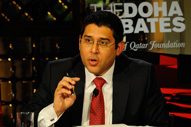
SHERIF TAHER
Well, Tim, my position is based on what I believe are two compelling arguments. The first is security: with a very fluid situation on our borders, I mean, Libya on one side, which has the potential of turning into a large-scale Somalia, and we've got the separation of Sudan. The southern Sudan is going to separate from the north of Sudan and this will bring in a new government in southern Sudan with an unknown position on the Nile Basin treaty for example. Of course finally we've got the situation on our eastern border. Our eager neighbour can turn this into a very hot spot, so our vulnerability is increasing, and having the military taking charge of running the country as opposed to defending it, is increasing that vulnerability and it's a situation that shouldn't be prolonged for long. Moreover the internal security is an issue that shouldn't be ignored. The army, as we all know, was part of four organisations in charge of running the country. Now, the NDP's gone, state security has gone, the presidency is gone, and they were replaced by the power of the people. Now, the army and the people relationship has been going very well so far, basically because the army chose to keep a very soft grip, rather soft grip, but if the factional demonstrations start getting out of control, the counter revolution which is a reality gets out of control as well, then the army might be forced into taking a very aggressive stance, and we'll be led to a point where we face the situation we did back in 1952-1954. My second argument is basically how we should go about managing the transition to democracy. But let me clarify one thing: I believe the 1971 constitution is dead, so let's just go ahead and bury it, not even amend it, but I also believe that the army shouldn't be the institution in charge of drafting our new constitution.
TIM SEBASTIAN
Okay. I need to ask you to wind up, please.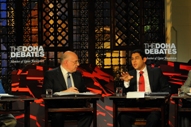 SHERIF TAHER
SHERIF TAHER
Well, in brief, I believe that the army should go back to manning their posts and do what they do best, protecting the country, and the transition to democracy should be done by an elected civilian government with a clear mandate and a clear milestone of every step on the way.
TIM SEBASTIAN
Okay, Sherif Taher, thank you very much indeed. So no delays to elections, get on with the elections?
SHERIF TAHER
I believe we should get on with the elections...
TIM SEBASTIAN
Sell the revolution short, only have half a revolution, just hurry up everything. The revolution wanted radical reform. You're not going to get radical reform if you go for swift elections. You'll get some of the old guard, you'll get some of the people who haven't had experience, haven't had time to get used to it.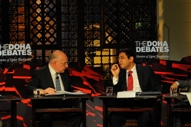 SHERIF TAHER
SHERIF TAHER
I don't believe that for a minute. The old guard has gone. I mean, I don't believe that one person in this room...
TIM SEBASTIAN
Familiar members of the NDP.
SHERIF TAHER
Well, the NDP's been burnt down in the street. I mean, every single building for the NDP has been burnt down, so we've done with one scarecrow in the old regime and now we're inventing two scarecrows. The NDP has gone. I don't believe anyone here in this audience is going to go and elect an NDP or an-ex NDP member. This is gone, so I'm extremely worried that we are going to get into panic mode and start raising another scarecrow which is the old NDP.
TIM SEBASTIAN
But what about giving time for the new parties to put their platform out there. I mean, this is a time when people have to explain what politics is about, the different options open to people. You want to curtail the options?
SHERIF TAHER
No, I believe in the saying that says 'perfect is the enemy of good.' The longer we wait for installing the perfect democracy, we might never get there.
TIM SEBASTIAN
But you'll never have a better chance of getting as close as possible to that perfect democracy as you have now. You've got the momentum of the revolution.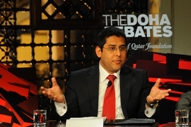 SHERIF TAHER
SHERIF TAHER
It's about the system; I want to install a system in place, that if we make a mistake selecting the wrong people, we can fix it; we don't get stuck with people for thirty years or sixty years. It's all about the system; it's not about the people. We should focus completely on drafting a constitution that lives up to the aspiration of the Egyptian people after all this time and not about personas. It's about the system that has to be put in place ...
TIM SEBASTIAN
... and just get the army out as quickly as possible....
SHERIF TAHER
Absolutely.
TIM SEBASTIAN
... because you don't trust them.
SHERIF TAHER
No, I trust them, I trust them. I trust them in the job that they know how to do best, which is defending the country and its freedom, as opposed to running the country in this day and age.
TIM SEBASTIAN
Okay. There must be few movements that are so trusted and yet people want to get rid of them so quickly. All right. Sherif Taher, thank you very much indeed. Okay. We've come to the point where we're going to ask you for your questions. If you please raise a hand, we'll get a microphone to you as soon as possible. All right, gentleman right at the back, you sir.
Audience questions
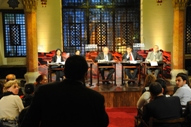 AUDIENCE (M)
AUDIENCE (M)
I'm directing my statement to Dr. Essam El-Erian. If you talk about a national revolutionary front, and you talk about 30 percent share. Under which command are you going to work, considering that Mr. Amr Moussa and Dr. ElBaradei calling people, or not agreeing with the constitutional reform and almost say vote by saying ‘no', and in the same breath you are talking about voting yes, so under which command you are talking about? ESSAM EL-ERIAN
ESSAM EL-ERIAN
Thank you, sir. I think Mr. ElBaradei and Mr. Amr Moussa are now in a very critical situation when they ask people to vote ‘no', because this is the only way for them to be a candidate. The constitutional reform opens the way for all individuals who fulfil the conditions in the constitution after reform, to run in presidential elections. Without this reform, Mr. ElBaradei, Mr. Moussa cannot run in the election. Secondly, now I think that transitional period cannot be summarised in a few months. It will continue because you are now building a new Egypt, a new political order. Not only political order: economic and social, we have new social contact...
TIM SEBASTIAN
You're not giving much time to build it, are you? Not the foundations anyway.
ESSAM EL-ERIAN
No, it will take a decision of the incoming parliament about five years, and we have in our history that after the biggest revolution in 1919, we had four years for having a constitution. Is this the revolution, we only will wait for one year for a new constitution, which can be a very good constitution for Egypt.
TIM SEBASTIAN Okay, let me go back to the questioner and ask how you feel about the elections. Do you want to delay them, or have them now? I'm asking whether you want to delay the elections or have them as soon as possible?
Okay, let me go back to the questioner and ask how you feel about the elections. Do you want to delay them, or have them now? I'm asking whether you want to delay the elections or have them as soon as possible?
AUDIENCE (M)
In brief, as a radical democrat, I can't call for any extension for the military rules, but on the same talking, I think that Muslim Brotherhood should play a pivotal role in forming this revolutionary front, but not the leading one, so...
TIM SEBASTIAN
Yes, but elections sooner or later, as fast as possible?
AUDIENCE (M)
So you need to go very fast in forming this one under a revolutionary command and you know if this front will not be formed very soon, it would be a zero-zero game. Thank you.
TIM SEBASTIAN
Okay, all right, thank you very much. Take a question from the gentleman in the second row.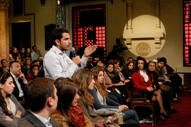 AUDIENCE (M)
AUDIENCE (M)
What I really want to say I want to direct to the Wafd party and as well as the Muslim Brotherhood. Don't you think that maybe, and this is the feeling that I'm getting, that you're rushing into elections because, especially Wafd, you know you lost the liberal street, you do not represent the liberal wing any more, and actually if you talk sincerely, what you have seen from Tahrir, is as soon as we have parties, you won't last because this is not the party of Saad Zaghloul or Makram-Ebeid. Thank you.
TIM SEBASTIAN
Sherif Taher. SHERIF TAHER
SHERIF TAHER
Well, this is beyond, okay, this is beyond political parties. This is a new order in Egypt, and the people who are in Wafd or otherwise, I mean it is, we're extending our efforts beyond the borders of our party. We really want what is better for the country as opposed to better for the party, so it is true that political parties, especially Wafd, have been suffering a great deal of limited movement, if you wish, in the old regime. But if we start by assuming that we want what is best for Al Wafd, as opposed to the best for the country, then we might want to extend the period for a little bit more to have a little bit of movement, but we won't do that. What we really believe in, what we really believe in, is that it is time at this point to get an interim government in place, and the only way to get an interim government in place is to have an election that would be fair, I'm pretty certain it would be fair and representing the people so that we manage ...
TIM SEBASTIAN
How could you be certain of that? 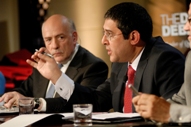 SHERIF TAHER
SHERIF TAHER
Well, the only thing that would make me feel certain that it would be free and fair is that the people wouldn't have it any other way. We've seen the people in Tahrir, I've been in Tahrir throughout the whole revolution and I believe that the people that I saw there and the people that came out on the streets all over Egypt will not have the elections any other way.
TIM SEBASTIAN (to questioner)
You're smiling at this. You agree with it? Can I get the microphone back to you please, just for a moment. Do you agree with that?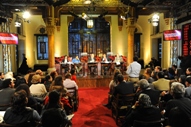 AUDIENCE (M)
AUDIENCE (M)
I can simply refute that in a heartbeat. Where were you when we were suffering on the streets from the beginning, where were the Wafd, where were the Muslim Brotherhood? Where were you when we said that we would boycott the parliamentary elections? I think you were participating in it, so if you're trying to say that in one way or another you represent us; I'm telling you, I'm very sorry, I was in Tahrir; I think a lot of people here are in Tahrir and I'm very sorry to say, you do not represent us. [applause]
TIM SEBASTIAN
We'll come back on that. SHERIF TAHER
SHERIF TAHER
I have to say, I was also in Tahrir and I was representing myself there. The thing is, we can sit here and point fingers at what happened in the previous regime all day long, but I believe that we are now focused on building the new Egypt. Now, we've been accused with many things in the opposition, but throughout the old regime's period, we were sitting in the trenches fighting and getting oppressed as much as everybody else, so I don't want to get into the debate defending other politicians.
TIM SEBASTIAN
Marwa Sharafeldin, you want to come on this. MARWA SHARAFELDIN
MARWA SHARAFELDIN
Yes. This argument that the political parties of the time of the old regime were in the trenches oppressed, I want to say that the youth who started 25th January were also oppressed and they managed to start the revolution, so we were all equal here. The other thing is, I think it's very important for the current political parties, please allow me to say that, to also take that time to restructure themselves. Whether it's the Wafd or the Al-Ikhwān or the Tagammu or all of the rest, you guys have serious problems in your own political parties. You have your youth revolting against you. And this has been covered by the papers over the past weeks. Your current structures are not even allowing the youth of your party to participate, whether it's in the leadership of the committees in the Wafd or in the Shura councils in the Al-Ikhwān.
TIM SEBASTIAN
Okay, you let him just come back on that.  SHERIF TAHER
SHERIF TAHER
But that is not true, because the position of the Wafd on the revolution from Day One that we have announced that we're participating in the revolution from 25th January. We decided from the very beginning that Al Wafd is not going to take over this revolution, or attempt to take over the revolution. We have suppressed our flags, we didn't come out with our identity, we have participated as Egyptians.
TIM SEBASTIAN
Okay, let Shaheer George come in.
SHAHEER GEORGE
My answer won't be that the Wafd was there, the Wafd wasn't there. He can't claim to be there and  there weren't any other political parties of the current parties that exist in Egyptian society at the minute there. And I have to say that they have proved dismal performance throughout the past elections, not excepting boycotting elections, and I think the last election was a bad side for the Wafd and other parties. I need to say something on the radical democrat who said that going into democracy, no we are in a democratic transition, we have to innovate in thinking what to do we need to get a parliament that represents the people, and at the same time secure democracy. We cannot simply say it's a choice between constitution ‘71 or an autocratic system. We have to innovate, we have to think of alternative solutions and they are there.
there weren't any other political parties of the current parties that exist in Egyptian society at the minute there. And I have to say that they have proved dismal performance throughout the past elections, not excepting boycotting elections, and I think the last election was a bad side for the Wafd and other parties. I need to say something on the radical democrat who said that going into democracy, no we are in a democratic transition, we have to innovate in thinking what to do we need to get a parliament that represents the people, and at the same time secure democracy. We cannot simply say it's a choice between constitution ‘71 or an autocratic system. We have to innovate, we have to think of alternative solutions and they are there.
TIM SEBASTIAN
All right, thank you. We've had some questions to this side. Let's have some questions to this side please (for the motion). You have a question for this side, okay, can we get a microphone to the front... AUDIENCE (F)
AUDIENCE (F)
Thank you very much. My questions are for the speakers for the motion. First of all, how do you envision the time period between now and when you do decide elections? I want you to think of a multi-faceted approach. First of all, who do you expect to write the constitution? Secondly, who do you expect to be in power during that time period, considering that the military has completely refused the concept of a presidential council despite the repeated calls for it? The other issue is a foreign policy issue; we have lots of issues that are not going to be addressed during this interim time.
TIM SEBASTIAN
Can we just deal with those first points actually, thank you. Marwa Sharafeldin.
AUDIENCE (F)
Sure.
MARWA SHARAFELDIN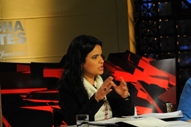 Thank you very much for asking this question, because I did not have the time to cover them in my opening remarks. So, I'm going to talk broadly and we can talk details as well if you want. First of all, the scenario someone like me is proposing is to have a constitutional declaration, after that you have a variety of options: you either have a presidential council, and let me tell you its not only up to the army to decide whether we are going to have a presidential council or not. We are the Egyptians, they are the Egyptians, no one is better than anyone, and they listen to us, and if you have noticed, they have changed actually one clause in the amendments, the one relating to, I don't want to get into legal issues, the one on the constitutional court and the court of cassation, so they listen, they listen and they change. So back to the scenario.
Thank you very much for asking this question, because I did not have the time to cover them in my opening remarks. So, I'm going to talk broadly and we can talk details as well if you want. First of all, the scenario someone like me is proposing is to have a constitutional declaration, after that you have a variety of options: you either have a presidential council, and let me tell you its not only up to the army to decide whether we are going to have a presidential council or not. We are the Egyptians, they are the Egyptians, no one is better than anyone, and they listen to us, and if you have noticed, they have changed actually one clause in the amendments, the one relating to, I don't want to get into legal issues, the one on the constitutional court and the court of cassation, so they listen, they listen and they change. So back to the scenario.
TIM SEBASTIAN
But they didn't lift the state of emergency, that was one of the chief demands, wasn't it?
MARWA SHARAFELDIN
That was Shaheer's question, don't come near me. Don't repeat the question twice. So to continue the scenario, constitutional declaration, and then the variety: either a presidential council, or... ESSAM EL-ERIAN
ESSAM EL-ERIAN
We have a constitutional declaration, by the army...You must know that we have a constitutional declaration.
MARWA SHARAFELDIN
No the constitution is dead and I have reasons here why it is dead. Let me continue please?
TIM SEBASTIAN
Please, I'll come to you in a minute, Dr. El-Erian, I'll come to you in a minute.
ESSAM EL-ERIAN
Okay.
MARWA SHARAFELDIN
And I will reply to that question as well later.
TIM SEBASTIAN
I want to go back to the questioner as well, so please be brief, be brief.
MARWA SHARAFELDIN
Very quickly, very quickly. Presidential council or interim president or the army continues which all of us here are very sceptical about. After that, after that, you have a national constitutional committee that represents all the people in Egypt, the parliament is a political balance of power.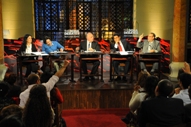 ESSAM EL-ERIAN
ESSAM EL-ERIAN
How? How, Marwa? How can we get this committee?
MARWA SHARAFELDIN
Will I ever continue what I want to say?
TIM SEBASTIAN
This is going on too long, please you need to come to a close on this.
MARWA SHARAFELDIN
And then finally you have the national dialogue with this committee to produce a new constitution and then you have the presidential elections and the parliamentary elections when you have a constitution that limits the power and you have something complete to fall back upon.
TIM SEBASTIAN
Let me just go back to the questioner, briefly. Are you happy with that answer? AUDIENCE (F)
AUDIENCE (F)
While it does satisfy me from that and the other question I had was, "What are you doing towards the poor. You're forgetting about the person who has a day-to-day wage, who has been hit hard by the revolution, who hasn't received their wage, whose family has been hit hard." That's the first part. The second part is ...
TIM SEBASTIAN
Sorry, we can't go into too many, you've had too many questions already. Thank you. Dr. El-Erian, come back in there.
ESSAM EL-ERIAN
If we have a presidential election before a parliamentary election, you are creating a new dictator. This is clear, because without any accounting by a parliamentary election before; without representing the people in all Egypt. Egypt is not Tahrir Square only, and the revolution was all over the country. You must respect the people in Upper Egypt and ...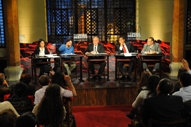 SHAHEER GEORGE
SHAHEER GEORGE
Tahrir Square is an important place.
ESSAM EL-ERIAN
Yes, of course, and we were there Shaheer. And we were also there during the revolution, Shaheer. And we want to debate in planning, and arranging, and supporting and protecting the revolution. We are as devoted as you, I was also a revolutionary and I spent eight years in the prisons of Mubarak regimes, struggling for democracy, for freedom, for all Egyptians. You must respect others.
SHERIF TAHER
I just have a question, when we say a presidential council or an interim president, who selects that? Who would choose for us an interim president? Do you know of any other way other than elections to get a person in power who is going to be in charge of drafting the constitution and not being chosen by the people? Do you want the military to choose that person for us?
MARWA SHARAFELDIN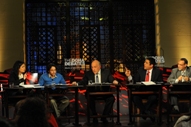 Okay. Very quickly you have two options. You either have appointment or you have elections.
Okay. Very quickly you have two options. You either have appointment or you have elections.
SHERIF TAHER
By whom? Appointment by whom?
MARWA SHARAFELDIN
We can have several options, either by a constitution...
SHAHEER GEORGE
By national dialogue and institutional dialogue...We have to learn from examples of other countries, Tunisia: they made a high constitution representing all political forces and they managed to reach a consensus on a committee that will design the constitution and they managed to achieve this, they can reach a consensus. The problem...
ESSAM EL-ERIAN
This can be achieved in the parliament. Not outside the parliament. SHAHEER GEORGE
SHAHEER GEORGE
They managed to achieve this consensus on the transitional government. People accept that we can reach consensus if all political parties...
TIM SEBASTIAN
Excuse me. Dr. El-Erian's point, the best place to reach a consensus is a parliament.
ESSAM EL-ERIAN
In the parliament.
SHAHEER GEORGE
The best place to reach consensus is in the parliament - if the parliament would be representative, if we don't have a pluralist representation in the parliament, you cannot say that this...
TIM SEBASTIAN
Okay, I'm going to take another question There was a gentleman in the front row.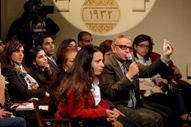 AUDIENCE (M)
AUDIENCE (M)
My question is to Dr. El-Erian: how do you expect to have a democratic parliament while there are no parties yet? The parties have three months to form and to make their campaigns while the Muslim Brotherhood has been there for over twenty years at least. How can we have a balanced parliament at this point that will decide the constitution, while we don't have the parties yet?
TIM SEBASTIAN
Okay, Dr. El-Erian.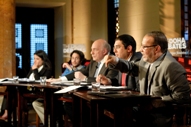 ESSAM EL-ERIAN
ESSAM EL-ERIAN
Actually you have now old parties, they can renew themselves, reconstruct themselves, actually. Secondly, you have a new power emerging in the society. Those new powers cannot build the parties outside elections. All parties build themselves in the elections. In the campaign they have to choose candidates, good candidates..
AUDIENCE (M)
People will not be able to elect a parliament if they do not know about the party and its ideologies and its programmes. So if we do not have a party that has been formed and has made itself known with its programmes, then nobody will elect them.
ESSAM EL-ERIAN
Look, my gentleman, all the youth movements I know them. They are working in the field, in the political field since abut two or three years. Not now. They are not found suddenly in Tahrir Square. They were there and they arranged themselves before. And they do a revolution.
TIM SEBASTIAN
I'm going to bring in Shaheer George here. 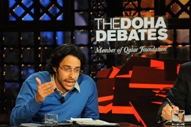 SHAHEER GEORGE
SHAHEER GEORGE
I want to emphasise, first I need to refer to Dr. or someone, he said that there's a new president, a new dictator will come, and I thank you for saying that, because this is what constitution ‘71 will do, and that's why we don't want constitution ‘71 and we want a provisional constitution that guarantees...
ESSAM EL-ERIAN
But you are going to have a new constitution...
TIM SEBASTIAN
Nobody can hear you if you talk at once. Sherif Taher ...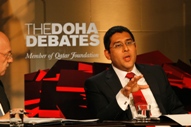 SHERIF TAHER
SHERIF TAHER
Let me just try to answer that because I think I have an answer for that one. Egypt has what you can say, four classifications, four colours in our political spectrum. Conservatives, I would claim, that is being represented by the Muslim Brotherhood and the offshoots of the Muslim Brotherhood. You've got the Egyptian Left, that could be represented by either Tagammu or whichever new parties that are coming in play right there. Then you've got your nationalists, your Nasserists and what-have-you, and in the middle you've got the liberal block. Now, each and every one of us in Egypt is going to ultimately belong to one of these four factions. Now, if we get elected, or if the representatives get elected on individual basis at this point in time, they are going to fall into one of these fours. This will automatically be the basis of four major, maybe two would be more powerful than the other two, parties - political parties that will help engage the political life in Egypt.
TIM SEBASTIAN
Okay, all right. I want to bring in Shaheer George here.
SHAHEER GEORGE
I just want to remind people that democracy without strong pluralism is a farce, when we have democracy that's only been monopolised with the other actors, with re-inventing the wheel of getting autocracy and getting lack of representation in parliament. The second thing, we are still trapped in the mindset of 1971. I think the failure is because we never had an institutionalised national dialogue. All the dilemmas, all the debates have never been put in properly into debate...
TIM SEBASTIAN
All right I'm going to move on because we've got a lot of questions there. Lady at the side, you.  AUDIENCE (F)
AUDIENCE (F)
My question is to Dr. El-Erian. Why do you only want thirty percent of the seats in parliament, when your leadership said you can get the majority any time?
ESSAM EL-ERIAN
No, we never said that.
AUDIENCE (F)
Yes, you did. And then another thing is that you often change your minds, and we know that.
ESSAM EL-ERIAN
Our mind is going to change every time. In the last election which was rigged, all know that it was rigged, we have twenty percent of the seats, and the brilliant Prime Minister Ahmed Nazif said to the Newsweek after the election that Muslim Brotherhood reserved also another forty seats added to the eighty-eight, this leaves about thirty percent of the seats. This is the answer for why we are calling for, or targeting, only thirty percent, to leave others, the rest of the seats for competition or for a united list and we are ready for a united list, with all political factions to go to the election united. I would like to say something. We never said that we can take a majority. All the time we said that a strong multi-party system is the best choice for any democracy, which we are calling for a good democracy. We want, we want to have a democracy, a good democracy in Egypt, checks and balances.
TIM SEBASTIAN (to questioner)
Okay. Are you happy with that answer?
AUDIENCE (F)
No!
TIM SEBASTIAN
All right, I'm going to move on, lady in the second row there. We'll get a microphone to you.
AUDIENCE (F)
Can I just object to this point because it's the same subject?
TIM SEBASTIAN
I'm sorry.
AUDIENCE (F)
Can I just talk about the same subject for a second, it's on unity.
TIM SEBASTIAN
Have you got a question or do you want to talk about something.
AUDIENCE (F)
No, it's a question, I'd like some further elaboration please.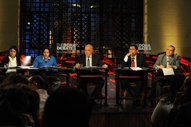 TIM SEBASTIAN
TIM SEBASTIAN
Okay, all right.
AUDIENCE (F)
Okay. I'm here as a young Coptic woman and I feel like we've neglected this subject for a bit, the subject of religious minorities and my question is whether ...
TIM SEBASTIAN
That's not really what we're discussing here tonight.
AUDIENCE (F)
It's unity.
TIM SEBASTIAN
We're discussing whether we have elections sooner or later, that's what we're discussing.
AUDIENCE (F)
Yes, but on the 19th is referendum and this is something that obviously will set in a time line.
TIM SEBASTIAN
I understand but if it's not geared to the subject that we're discussing, please we'll move on. Thank you. The lady in the second row. AUDIENCE (F)
AUDIENCE (F)
Thank you. I would like to follow up on your question directed to Dr. El-Erian.
ESSAM EL-ERIAN
It's not just all questions directed to me? Yes, okay?.
AUDIENCE (F)
So my question, thirty percent, and I'm using your words, the remaining seventy percent are open to competition. Meaning that...
ESSAM EL-ERIAN
All united list, a national list.
AUDIENCE (F)
Meaning that thirty percent are out of competition. And you are...
ESSAM EL-ERIAN
No. AUDIENCE (F)
AUDIENCE (F)
And you are trying to say that you are, allow me to finish my question please and then you have all the time to respond. My question is: if you are really willing to play by the rules of the democratic game, then from day one you should not be taking a part of the cake by deciding that you will be taking thirty percent of the seats. I mean, if we are trying to build a democratic and a unified front and you talk about unity all the time, since you came up here, you said unity, but I don't see unity in anything that the Muslim Brotherhood have been doing for the past two weeks, three weeks, so please...
TIM SEBASTIAN
All right, let's let him reply to that. ESSAM EL-ERIAN
ESSAM EL-ERIAN
First of all it is not a cake to divide, it is not a cake. Now we are facing a critical moment. We have the momentum of the revolution, to continue with this momentum for building a new Egyptian order which is democratic, we want to discuss and have a dialogue with each other. We are targeting thirty percent; we are not dividing the cake. We are targeting thirty percent of the seat as we gained in the last election. To achieve this we can appoint more than thirty, because maybe we lose, all candidates cannot in the same power. So, it is our goal, it is our aim, not our condition.
TIM SEBASTIAN
All right, I'm going to ask Marwa Sharafeldin to come in.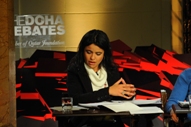 MARWA SHARAFELDIN
MARWA SHARAFELDIN
Okay. Dr. Erian you are talking about national unity, you are saying this is not a competition, we have to work together on one hand and then we are talking about elections. Something is not fitting here, that's one thing. You are talking about thirty percent only, fielding thirty percent only and then we come and talk about democracy. Your group is taking about the civil state versus no women or Copts as president...these are two paradoxical...
ESSAM EL-ERIAN
No, no, no, no Marwa, no Marwa.
TIM SEBASTIAN
Okay, let her just finish the question and then you can come back in.
MARWA SHARAFELDIN
You have been cutting in on all of us tonight, so please let me continue.
TIM SEBASTIAN
Briefly.
MARWA SHARAFELDIN
So, there are too many paradoxes and that's exactly my point, that the Muslim Brotherhood, among the other parties, need to seriously restructure and rethink their programme again. Rushing into elections is not going to get you anywhere with democracy.
TIM SEBASTIAN
Okay, let him answer that.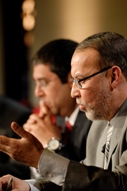 ESSAM EL-ERIAN
ESSAM EL-ERIAN
Okay, first of all there are no candidates to run the presidential election. It is a right for all Egyptians...All candidates have the same right, all Egyptians have the same right - women, Coptics, Muslims, all have the same right. But for ourself, if we nominate a candidate which is not going to be in the incoming presidential election, we will name another one, another choice. Secondly, I said clearly that we are in a moment of unity and we have a historical experience. We have unity with Wafd party in 1984, we have unity, united list alliance with labour party and liberal party in 1987, this is a list. All the countries know that the people can have alliances. It is time to be allied all, all of us to be allied ....
TIM SEBASTIAN
Okay.
ESSAM EL-ERIAN
And then after that the competition can come, because we are going through a very big task to build ...
TIM SEBASTIAN
We're going to move on, take a question from the gentleman in the middle there.
AUDIENCE (M)
Thank you very much.
TIM SEBASTIAN
It's a question please to this side.
AUDIENCE (M)
I'll put a comment and a question for everyone.
TIM SEBASTIAN
Okay.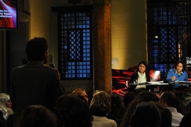 AUDIENCE (M)
AUDIENCE (M)
My comment is basically, I'm sorry to say that people are debating Islamic group's ruling but what we have seen in the Middle East, so far, no Islamic group can really rule because they never go up for competition. Even Hezbollah, the biggest one that you talk about, only asks for one-third of the government so they can create some sort of a block on any decision, so what we have seen is just Islamic groups talking and talking without doing any much in the real arena of politics. The question is, those who are claiming that elections or the referendum should take place and you're talking about security, you never mentioned anything about the internal security of the country. You're talking about sixty percent, if not even less, of the policemen in the streets by the Ministry of Interior. You're talking about not enough judges to go to the polling stations. You're talking over forty thousand polling stations with only fifteen thousand judges. How come you're going to have fair election and a free election and you're going to tell me: "We want to do this next Saturday." Thank you.
TIM SEBASTIAN
Okay, let Sharif Taher come in.
SHARIF TAHER In 2005 that's exactly what we had. We had a judge on every box and that turned out to be a little bit better than what we had in 2010. Now I believe very firmly that the people who are going to protect the ballot box this time are going to be us. We are going, we are not going to have, and I'm not talking about Al Wafd, I'm talking about each and every Egyptian, we are not going to accept rigged elections any more. This has gone. I don't believe that any person here would actually stand or allow for elections to be rigged. We will protect it. The people who actually cleaned the Tahrir Square after the revolution, this spirit that was ignited in the Egyptian people would allow us and would actually compel us to protect the ballots and the boxes. So I believe that we can actually secure it ourselves.
In 2005 that's exactly what we had. We had a judge on every box and that turned out to be a little bit better than what we had in 2010. Now I believe very firmly that the people who are going to protect the ballot box this time are going to be us. We are going, we are not going to have, and I'm not talking about Al Wafd, I'm talking about each and every Egyptian, we are not going to accept rigged elections any more. This has gone. I don't believe that any person here would actually stand or allow for elections to be rigged. We will protect it. The people who actually cleaned the Tahrir Square after the revolution, this spirit that was ignited in the Egyptian people would allow us and would actually compel us to protect the ballots and the boxes. So I believe that we can actually secure it ourselves.
MARWA SHARAFELDIN
Can I break come news for you actually? We have had confirmed reports today that there are people buying votes for the coming referendum. Don't talk to me about us protecting the ballot boxes.
SHERIF TAHER
It's interesting, because..
TIM SEBASTIAN
No, please let her finish and then you can come back in.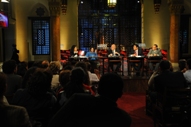 MARWA SHARAFELDIN
MARWA SHARAFELDIN
His point is extremely valid. Today we are all tense on the streets because of security. You want to add to that tension, to have elections and thugs who are being hired by certain people, I'm not going to point any fingers, and put us in a more risk, a security risk. And you want to have three elections? This is suicidal...
SHERIF TAHER
How are we going to like it in six months' time when the counter-revolution or so-called counter-revolution gains more momentum and the security situation is even worse?
MARWA SHARAFELDIN
Who said they are going to gain more momentum?
SHERIF TAHER
Who said it's not going to be? Who would actually claim today that whatever time we allow 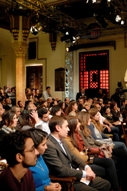 ourselves to have, is time that we give to the people that you didn't want to mention the names, to actually gain more momentum and more power, to actually hire more thugs, to reorganise themselves. I want the revolutionary spirit to be in charge of getting this election on a roll.
ourselves to have, is time that we give to the people that you didn't want to mention the names, to actually gain more momentum and more power, to actually hire more thugs, to reorganise themselves. I want the revolutionary spirit to be in charge of getting this election on a roll.
TIM SEBASTIAN
I'm going to take a sampling of opinion from the audience. I just want to give a few people the microphone. Please just give us a sentence on whether you actually think Egypt is now in a position to have free and fair elections. If we can get a microphone down to the front here, can we, could you bring a microphone down to the front please. All right. Could you just give it to that lady there, please. You, I would like to ask you whether you think Egypt can now have free and fair elections. Do you want to say anything on this? Do you have faith in this?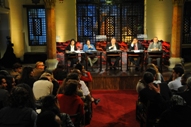 AUDIENCE (F)
AUDIENCE (F)
No, I didn't agree with them in saying that they need to wait and people need to have the chance to plan and organise themselves in order to have free and fair elections.
TIM SEBASTIAN
Okay, the lady sitting next to you.
AUDIENCE (F)
I agree as well, especially in terms of gaining momentum and popularity.
TIM SEBASTIAN
Okay, the gentleman sitting in the second row, can we get the microphone? Very briefly please, comment on this.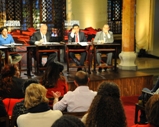 AUDIENCE (M)
AUDIENCE (M)
I agree with waiting for later time to carry out the elections because a new Egypt is being formed, and I think we should give space for new ideologies to be formed, instead of building it on a set of old ideologies, and old regimes...
TIM SEBASTIAN
And you're not worried about losing the momentum of the revolution?
AUDIENCE (M)
No, it will not be lost.
TIM SEBASTIAN
Okay, gentleman over there. I'm just taking the audience's temperature at the moment. AUDIENCE (M)
AUDIENCE (M)
As much as I hate this, I have to say that I agree with Dr. Erian and with Sherif Taher from Wafd. I do not think it is sane for any people in the world to prolong military rule. I do not think it is fair for us to suffer under military rule. I think people should read history again and see what kind of period we lived in in 1952 to 1954 under the military regime and that was previous to the dictatorship that we suffered under in the following sixty years.
TIM SEBASTIAN
If you would kindly pass the microphone to the gentleman behind you. I'm wondering how you feel on this Sir. AUDIENCE (M) (Hisham Kassem)
AUDIENCE (M) (Hisham Kassem)
I truly don't think that delay of the elections is going to help a democratic process because I believe a democratic process is going to take between five to ten years, and the idea that we're going to be sitting there with tanks in the street to maintain the order or stability of the country and think that we can boil a constitution as we say. If we look at something like the competence of the president, it's over seventy percent of power in Egypt, and it's going to take some time to disassemble that but not end up with a lame-duck president in the future. So I am for elections immediately.
TIM SEBASTIAN
Okay, the lady next to you. AUDIENCE (F)
AUDIENCE (F)
Well, unfortunately I'm quite sure that if we delay the elections, we will give a big chance for some parties and powers, unwanted ones, to get organised and re-organised and this will be very dangerous, and we would dream about democracy but if we dream about democracy in few months, total democracy, I don't think it can happen also, so we have to accept the outcome of the coming elections, even if we are not 100 percent democracy, for the sake of better situation at least on the part of democracy.
TIM SEBASTIAN
Okay. I'll pass the microphone to you and just we'll get brief comment please from you on that, whether you think Egypt is in a position to have free and fair elections.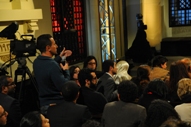 AUDIENCE (M)
AUDIENCE (M)
I think it comes down to our belief in the Egyptian people. If we believe that the Egyptian people were able to conduct a revolution that no-one else was able to do before, then we can believe in the Egyptian people to lead themselves and to be able to build a real constitution and to do this we will need time, and anybody who says that they are scared of security or scared of internal issues, and are trying to use the same scare tactics is belittling the Egyptian people, and these are the same people that do not have faith in the Egyptian Revolution.
TIM SEBASTIAN
Now Sharif Taher, do you want to relate to some of that and then I'll come to you on this side to react to that.
SHARIF TAHER
I want to reiterate one thing that I've said, is that I believe that the ‘71 constitution is dead. I'm not at all for amending it even, but that doesn't automatically mean that we delay the democratic process. There are, I would agree on you in that one. We can come immediately with a constitutional declaration that defines the authorities of the interim president. I also believe that we want to move into transition mode. At this point of time we are in revolution mode. This is extremely energy consuming. We need very quickly to move into transition mode. Once we move to transition mode, this cannot be under the military. I don't want the military to be the entity in charge of our transition to democracy.
TIM SEBASTIAN
All right, Marwa Sharafeldin. MARWA SHARAFELDIN
MARWA SHARAFELDIN
Okay. I want to ask the question: "Why should we go for elections that will produce a parliament that we will later have to disband after constitutional, after the final constitution is done. The other thing I want to say is ... "
SHARIF TAHER
You don't know that. We don't know that.
MARWA SHARAFELDIN
...let's not only talk about political parties being the only players. We have syndicates, we have NGOs, we have the Popular Front.
TIM SEBASTIAN
Hisham Kassem's point was that it will take five to ten years to get democracy.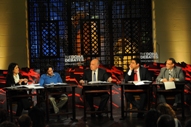 MARWA SHARAFELDIN
MARWA SHARAFELDIN
That's not true actually because the schedule we have is exactly the same in time frame, it's not less with the one they are proposing. So, the final thing I want to say is that: guys, the option is not between military rule and elections. All of us are against military rule. This is not what we are discussing today.
SHARIF TAHER
I'm afraid it just is.
MARWA SHARAFELDIN
The options are between building the democratic infrastructure in this country that well ensure free and fair elections and democracy, or going back to instability and autocracy against step one.
SHARIF TAHER
But you're completely disregarding the fact that while these are very interesting words that you just said, but during that transition, we are under military rule.
MARWA SHARAFELDIN
No.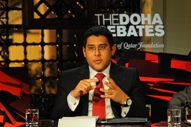 SHARIF TAHER
SHARIF TAHER
We are.
MARWA SHARAFELDIN
I gave you scenarios where there is civilian rule involved and you don't want to listen to it.
SHARIF TAHER
No, no, no, I've listened very well to that proposition.
TIM SEBASTIAN
Okay, I want to bring Hisham Kassem back to answer the point from Marwa Sharafeldin.
HISHAM KASSEM (audience member)
The point wasn't very clear, I have to say. Could you make it again?
MARWA SHARAFELDIN
Which one? I said three points.
HISHAM KASSEM
The last point you made.
TIM SEBASTIAN
Where you turned down what he said before.
MARWA SHARAFELDIN
Okay, yes. I was saying that having a road map in front of our eyes ...
TIM SEBASTIAN
That it would take three to five, five to ten years to get democracy, that was Hisham Kassem's point.
MARWA SHARAFELDIN
Yeah, yeah, yeah. I was saying that ...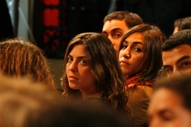 TIM SEBASTIAN
TIM SEBASTIAN
And you said he was wrong.
MARWA SHARAFELDIN
I was saying that, the option is not between: either we have military rule or elections. These are not the choices we are only having today. We can also have another option, which is between building a democratic infrastructure in this country, that's one option, and taking some time to ...
SHERIF TAHER
But I'm going to have to ask you to talk specifics now.
MARWA SHARAFELDIN
And between having instability as a result of hasty elections and going back again to autocracy, step one. HISHAM KASSEM
HISHAM KASSEM
How do you think stability will be maintained in the country while we have tanks out there with zero tourism, with curfews being imposed?
MARWA SHARAFELDIN
Okay, you are again being subject to the first choice. It's either military rule or elections. I'm proposing, no, we don't have to go out and find tanks in the street...
HISHAM KASSEM
Well, this talk about presidential council is completely unrealistic because if we do, and I don't see the criteria of how to have a presidential council put together, but if it has civilians and military, every time the civilians will disagree with the military, they'll be told to leave the room. Military don't negotiate with civilians and I think it's the fervour of the revolution that is making a lot of people think that military are negotiating and accepting points. I really don't think so. The revolution is over, we need to enter into a political process and start building for the future.
TIM SEBASTIAN
I want to bring Shaheer George in. 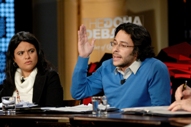 SHAHEER GEORGE
SHAHEER GEORGE
I need to say so many things. We are still in a very autocratic mindset, the counter-revolution will only be combated, it'll be combated not by making early elections, it will be combated by making a strong pluralist environment and a strong civil society. If you care about counter-revolution after one year, I tell you, after one year they will have no say in the parliament when we have a strong political party that's able to compete. The second thing, I'm glad that I'm sane and I don't believe that I want to extend military rule, there are plenty of alternatives. If you don't think a presidential council can reach a consensus and we can make it a provision in the constitution, something that says that the decisions with the presidential council is not under the monopoly of the army; even if you think it's a realistic option, let's think of an interim president ...
TIM SEBASTIAN
Okay, we haven't heard from Essam El-Erian, please. ESSAM EL-ERIAN
ESSAM EL-ERIAN
Marwa, it is not only the option that the parliament must be counselled after making a new constitution. In 1971, and I am studying history, the parliament was not counselled after putting this constitution. The parliament can have a transitional article in the new constitution that the parliament can continue to steal and end it in five years, so I think you must take in consideration that your options are not the only options.
MARWA SHARAFELDIN
Of course that's what you would say, Mr. El-Erian, because you would have a majority.
ESSAM EL-ERIAN
No, we are not going to majority. We are not targeting a majority at all and we give help to everybody and our history is clear that we help Al Wafd and we help liberal party...
TIM SEBASTIAN
Please don't all speak at once. Hisham Kassem, you wanted to come back on that.
HISHAM KASSEM
Yes, I have to disagree about the point that if we have elections immediately the Muslim Brotherhood will get a majority. If the other liberal currents, liberal, left etc. do their job, well I estimate the Brotherhood will get ten percent of parliament. If they do not, they will get twenty percent at most and it's going to be a coalition.
MARWA SHARAFELDIN
I agree...
HISHAM KASSEM
On that point I say to my good friend Essam El-Erian, it's time for unity I agree with you fully, but it's also time for competition and like you are working now for your political current to get as much as possible which is legitimate. I am personally, and you know where I am coming from, working to make sure that the liberal current gets as much as the Brotherhood and even more.
TIM SEBASTIAN
Okay. I'm going to take a question from the lady in the third row. 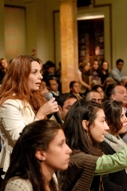 AUDIENCE (F)
AUDIENCE (F)
I'm just directing my question to you with the parliament to be re-elected again after the new constitution. It has to be re-elected because you're doing the parliamentary elections now. You're doing the parliamentary elections with fifty percent, with farmers and illiterate people, so once the new constitution comes out, you have to re-elect another parliament.
ESSAM EL-ERIAN
No it is up to the committee.
AUDIENCE (F)
That's not what we want.
TIM SEBASTIAN
Excuse me, could you let him finish.
ESSAM EL-ERIAN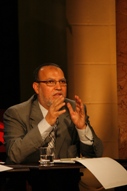 We have history in this, I said that clearly. We have in 1971 a new constitution and in that transitional article, they said that this parliament which makes the constitution ends after a time not suddenly. So you can do it, you can do it if you are ready to have another option. I said it's another option, it is not the only option also. We have options that you said we can cancel the parliament and have a new one and we can also give this parliament...
We have history in this, I said that clearly. We have in 1971 a new constitution and in that transitional article, they said that this parliament which makes the constitution ends after a time not suddenly. So you can do it, you can do it if you are ready to have another option. I said it's another option, it is not the only option also. We have options that you said we can cancel the parliament and have a new one and we can also give this parliament...
TIM SEBASTIAN
You wanted to make a point.
SHERIF TAHER
Yes. The point that the Egyptian people are not going to be able to elect representatives has been a point that the previous regime has put forward. We've heard it by the ex-Prime Minister Nazif that the Egyptians are not ready for democracy, and I believe and everyone here believes that 25th January has proven them wrong. I have a very strong belief that the Egyptian people are ready and able to weigh their options. They will understand. They might not be electing for political parties now, but you know what, this is an interim period, we're getting into a transition where they, where the Egyptian people will have to select their representatives, people that represent them and then the parties, the political parties will follow in due course.
TIM SEBASTIAN
Okay, very briefly. Shaheer George.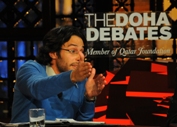 SHAHEER GEORGE
SHAHEER GEORGE
I think I agree completely that the Muslim Brotherhood won't take the majority and I believe that the Egyptians are ready for democracy. What I'm saying, that we need to give them options. If we have strong pluralist option, neither the Muslim Brotherhood or Al Wafd, or all these parties will take the lead in the elections. Bring them a strong pluralism and I guarantee you that the majority will be for those who defended this revolution and not those who played with the old regime and were part of the old regime.
ESSAM EL-ERIAN
We don't play with the old regime at all. We were opposing all the time for sixty years, not thirty years. We were opposing all dictatorship for sixty years.
TIM SEBASTIAN
Okay, thank you very much. I'm going to take some questions from the back, the lady up there, please. We haven't forgotten you.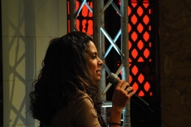 AUDIENCE (F)
AUDIENCE (F)
My question goes to Dr. Erian as well, which goes back to a point where you said that people were not born overnight in Tahrir. They've been there and practising politics for two or three years, and I think this disregards completely something like a great accomplishment of this revolution which is that you brought awareness to so many new people that want to participate in the political life that were never there before. So how do you give them, how can they reorganise, how they can organise themselves originally when they were just born yesterday.
ESSAM EL-ERIAN
How much time do you need for organisation? One month, three months, one year, two years, three years?
AUDIENCE (F)
Not one month for sure because until now the parties cannot be really...
ESSAM EL-ERIAN
Two years, three years, five years?
TIM SEBASTIAN
Let her answer the question.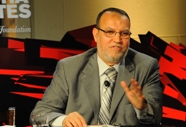 ESSAM EL-ERIAN
ESSAM EL-ERIAN
Al Wafd party was built in the revolution in 1919. It was created in the revolution itself.
TIM SEBASTIAN
If you ask a question, could you let her answer it and likewise. This isn't a shouting match.
AUDIENCE (F)
I think the minimum transition of state has been a year to a year and a half until now, in any other example in the world.
ESSAM EL-ERIAN
I said clearly that the parties are created in the streets, not indoors. They can go to the elections and ...
AUDIENCE (F)
Is the Muslim Brotherhood created in the streets? Do they hold meetings in the street?
TIM SEBASTIAN
Okay, please, this is not a shouting match. One person speaks and then another one. This is a debate. Marwa Sharafeldin, have you got a timetable? You want to delay elections? Till how long?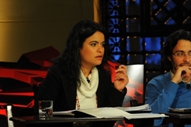 MARWA SHARAFELDIN
MARWA SHARAFELDIN
The timetable we have, that's another point I wanted to raise. We do have a scenario but we are not doing like these guys, we're not saying our scenario is the best. We are saying there are several scenarios...
TIM SEBASTIAN
Do you have a timetable and what is it?
MARWA SHARAFELDIN
I have a timetable, which ends in June 2012. Their timetable after the military came out day before yesterday ends in September 2012. We have to have a national dialogue on all the possible scenarios that are there. We have a scenario, they have a scenario, these guys have a scenario. You know what? One of these guys might be the future president of Egypt and we're not giving them a chance. They can be wanting to form parties, political parties, syndicates, NGOs, we're not giving them a chance. Why are we rushing this? This fast-food democracy can only create indigestion.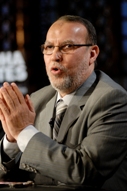 ESSAM EL-ERIAN
ESSAM EL-ERIAN
Who is preventing anyone from having a chance? The chance is for everyone. Who puts obstacles in front of anybody to have parties? Who can do that? Nobody can do that. Even the dictatorship cannot prevent anybody from having a party.
TIM SEBASTIAN
All right. I'm going to take a question from the gentleman over there.
AUDIENCE (M)
I just wanted to address the two concerns that the right side of the panel said. One about security, all the countries around us have their own problems, I think they have their hands full, no-one is really looking to attack us, no-one's really looking to invade us and if they do, they're pretty stupid to do so. The other is about fragmenting the country if we prolong this process. Well, essentially if you do this process too soon, that's essentially exactly what you're going to do but its going to be bloody, and it's going to be very violent, given the history of the elections and the thuggery that is behind election day, and also the distaste that the population, especially the younger population, has shown for the old political parties and the old players. If you go ahead with this election too soon and the representation is as it is expected to be from the parties that have had a chance to do it, you're only alienating sixty percent of the younger population that are already alienating within your own parties.
TIM SEBASTIAN
Sharif Taher. SHARIF TAHER
SHARIF TAHER
Your point of view that trouble in our neighbouring countries is not going to affect us, is actually something that I don't participate to at all. Like I said before, if we end up in a Libya with a situation that is very fluid and it's turning into to a large-scale Somalia, like I said before, is something that would be a direct threat to our national security. Now, I can give you an example of how today Egypt is vulnerable because the military is being occupied by running the country. We know, I mean you've heard a few days ago Burundi has started signing to the Nile Basin Treaty ...
TIM SEBASTIAN
Okay, I don't want to get on to Burundi. I want to stay on the subject that we are talking about here.
SHARIF TAHER
I'm just making the point that there are people out there who are going to make use of our vulnerability of having the army occupied with running the country instead of defending it. SHAHEER GEORGE
SHAHEER GEORGE
I think before talking of elections, no answer has been given on what will we do with the six million or eight million Egyptians abroad. Have we decided to include them in these elections or not? What did we decide on international monitoring, what did we decide about security situation, how do we want to go in connection with thuggery? I think the Muslim Brotherhood had experience with thuggery but I'm afraid not all Egyptians are capable to deal with thuggery. We need security, we need insurance that no one will threaten our right to go to vote, and we need the eight million Egyptians abroad to have the right to vote, and we need international monitoring to ensure that this election will not be rigged. These questions have to be sorted before venturing into any election.
TIM SEBASTIAN
Okay, all right. What I need now is a question to this side of the argument (for the motion). You have a question for them, the lady in the front row.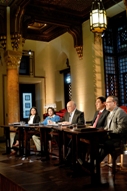 AUDIENCE (F)
AUDIENCE (F)
Okay, so generally I'm for postponing the elections. However, I think considering the forty percent of the population that is suffering from poverty and unfortunately that have been suffering even more post the revolution. We know the scenario of if we move on to a path that I don't personally prefer, what's going to happen economically and to these people. However, during these unstable times of discussions, what will be the fate of these people who are already suffering and we just haven't seen them yet?
TIM SEBASTIAN
Marwa Sharafeldin.
MARWA SHARAFELDIN
I'll pass over to Shaheer, if you don't mind.
SHAHEER GEORGE
I want to say that the transitional period is not a surprise and it's not an exception, and we're not the only word. If we had a legitimate transitional government, I think that has been the problem... TIM SEBASTIAN
TIM SEBASTIAN
She's asking about the poor people.
SHAHEER GEORGE
The poor people is because we didn't have a transitional government, we didn't have the ministries, the stable ministries that will stay and will talk to these people and sort these issues. We need a transitional government that can stay through the next year.
TIM SEBASTIAN
You're not answering her question.
AUDIENCE (F)
However economically, for the people who have been suffering, it's a consequence of the revolution that tourism has stopped or economy is kind of at hold, and these people are relying on their day-to-day wage, they are not receiving that wage.
SHAHEER GEORGE
Have a road map for here, have a solid transitional government for a year, they will be able to help. Because you cannot say that those people are suffering because we did not have a strong government.
AUDIENCE (F)
I completely agree. However, what is the plan during these discussions for these people in order to get their lives moving, to have their daily wage in order for them to survive during that period of time.
MARWA SHARAFELDIN
Okay, can I ...
TIM SEBASTIAN
Oh, you want it back now, do you?  MARWA SHARAFELDIN
MARWA SHARAFELDIN
Okay, my question would be to you. If we have elections today or very soon, do you think the problem of the poor people would be actually tackled? I personally don't think so. I'll continue with you. I think it's a matter of political will at this point in time. It's something for the interim government to work on. It has nothing to do currently with whether we should have elections now or we should have elections later, because the problem would still be there, whether we postpone elections or not, since it's a matter of political will on the side of the government.
TIM SEBASTIAN (to questioner)
Are you satisfied with that?
AUDIENCE (F)
Not really because it doesn't really say how are you considering these people in your plan? I agree with your side, however I'm asking: "What are you going to do for these people who are involved and are affected by our decisions and what we want. However, at this moment they're suffering. And over time if the wheel doesn't run again these people are going to get angry because they're suffering from the consequences of what has happened.
TIM SEBASTIAN
Very briefly and then I'm going to go to Sherif Taher.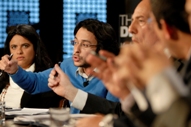 SHAHEER GEORGE
SHAHEER GEORGE
The key is instability and those people are suffering because we need a level of stability. Stability will come with the solid interim... it's not me who will be the government to address this. I'm saying that these people are suffering because there hasn't been a solid interim government, and there hasn't been a solid road map for people to know that we're heading to the right direction: tourism, and if we have a road map and we have a clear direction of where we are heading, this will create stability.
TIM SEBASTIAN
Sherif Taher.
SHERIF TAHER
I really appreciate you using the word 'stability' because obviously the only way for having a stable government is having this government being endorsed and chosen by the people. We have seen how much of instability that we've seen over this past month alone, because the military has been doing government by trial and error. Okay, we'll give you this guy...No, we don't like him... so we'll give you another one...and we like him. So the shortest cut would be to go directly to the people, let them elect their own government. There is a difference between having a caretaker government which is what we have today, and a caretaker government is always going to be characterised by people who would not actually take major decisions. They are there just to keep the lights on. We need to move on to our interim government that has a clear mandate, a clear support by the people and the only way I see that happening is by having the people choose their government. I've seen the people choose Essam Sharaf. No, it isn't your orthodox elections, if you wish, but it is a form of the people power choosing the person who's going to rule.
TIM SEBASTIAN
Essam El-Erian. ESSAM EL-ERIAN
ESSAM EL-ERIAN
I read today in the El Akhbar newspaper that the parliamentary election will be held in next September, not June, and I think that is enough time for organising themselves, for making campaigns; a campaign will be for about two months only.
TIM SEBASTIAN
You're talking about presidential election or parliamentary?
ESSAM EL-ERIAN
Parliamentary. So if four months is enough for everybody to organise themselves, to have planning for campaign and it is good for all people, if they need not four months but four years, we shall wait, unstable country.
SHAHEER GEORGE
We're not talking about forty years and we're not talking about ... and I think this is an indicator, the military will listen. The voice when it's stronger and being heard, the military will realise that we have to postpone elections and we said no to the referendum. My second point, related to the idea of the parliament is the source of instability. I agree, but if we have a strong pluralism and strong representation, but then under-represented parliament with those in the revolution won't be represented, it's a clear prescription for instability. Those who won't be represented in parliament will go in the streets again because they won't find the representation in the Muslim Brotherhood, or Al Wafd, or those actors that do not represent the revolution.
TIM SEBASTIAN
All right, okay. Gentleman in the third row. AUDIENCE (M)
AUDIENCE (M)
Armies don't run countries, believe me, armies don't run countries. Armies protect countries. Please get the tanks out of the street, that's what I want to say. The tanks in the streets are a horrible sight, not only to tourism and business, to everybody, to our kids. As much as I, you know, the army has to get out of the street, that's my only point. Thank you.
MARWA SHARAFELDIN
I will arrange it with them, yes. What we are saying is that the army does not have to be here in the interim period. I think this is somehow we have to hammer on all the time in this panel. The option is not to have the army stay. Actually there are very open civilian options that we can have. As Shaheer said, the army is prone to pressure. Yes we have to put pressure, sometimes we have to put a lot of pressure, but eventually the army is not going to make a big mistake of opposing the people and shooting at them.
TIM SEBASTIAN
Let me just ask, how do you know the army is subject to your pressure, how do you know the army's going to listen?
MARWA SHARAFELDIN
Look at the postponement of the elections that Dr. El-Erian was talking about, and look at the content of the amendments. One of the clauses in these amendments have changed yesterday.
TIM SEBASTIAN
One.
MARWA SHARAFELDIN
Yes. That's a good indication.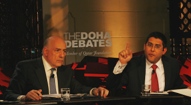 SHERIF TAHER
SHERIF TAHER
Can I go back to the point that I made in my opening statement. I need to go back to the point that I made in my opening statement; I was saying that the army is now keeping a soft grip voluntarily. If the situation, if the security situation in Egypt turns sour, then the army will have to take a much more aggressive stance. They will not have an option. We don't want the army in the street facing the people. You see, those fractional demonstrations and the counter-revolution that I spoke about are real threats. They're not imaginary threats, they are real threats, and we've seen the army taking a very soft stance on the incident with the church in Talbiya, because they don't want to incite the people, they don't want the people to revolt against the army. The army is the only institution left standing in the country today.
MARWA SHARAFELDIN
Exactly. That's why they don't want it. By pressure.
SHERIF TAHER
Well, the army hasn't been very subject to pressure. I mean, because they are, they've conceded for a few demands. The army conceded for a few points, but let me tell you, if the security situation in the country turns worse, the army would have to intervene to protect.
TIM SEBASTIAN
Okay, you've said that, all right, gentleman up there, you have a question. Right at the back there yes, you.
AUDIENCE (M)
I'm kind of on the fence, so I'm probably more leaning towards voting no or for postponement, but my question for those against the motion: what would we do if the vote turns are to be yes?'
SHAHEER GEORGE
I'm sorry I didn't get that.
AUDIENCE (M)
No, my question is: what would we do for those who are against the motion or those who are against voting or voting no or postponing elections.
SHERIF TAHER
You're talking about the constitutional amendments, right?
AUDIENCE (M)
Of course, yes. What will we do if people vote yes for the amendment of the constitution?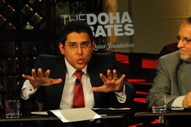 SHERIF TAHER
SHERIF TAHER
Then we're going to have to learn to do one thing, which is accept the rule of the majority. If the majority decides that we should have this, I personally would vote no for the constitutional amendments, but if the majority votes for the constitutional amendments, then that would be it. Let me clarify one thing: the constitutional amendments is not the only route. I'm for having early elections but under a constitutional declaration and not this...
ESSAM EL-ERIAN
I'll vote yes and this is the only route for a new order for Egypt.
TIM SEBASTIAN
I want some questions for this side of the argument (for the motion), okay? Who has questions for this side?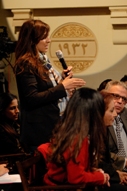 AUDIENCE (F)
AUDIENCE (F)
You outline that an interim government would be put into power either by appointment or by elections. My sense is that a blatant appointment of an interim government wouldn't be entirely embraced by the population. Therefore you'd have to rely on the latter, on elections. So wouldn't this more or less entail the same process, which is rule of the majority that they're (against the motion) calling upon. Also, you said that you'd like to see this process brought to a halt by June 2012. It's only natural there's going to be in-fighting because of the plurality of the country. What if it stagnates or prolongs, what is your answer to that?
MARWA SHARAFELDIN
Okay. Shall I go?
TIM SEBASTIAN
Yes, please. MARWA SHARAFELDIN
MARWA SHARAFELDIN
All right. You can actually have a combination of both. That's another of the scenarios that we've been studying actually. You can have a combination between appointment and elections. How? So one of the possibilities is that the presidential council, if we decide it's a presidential council not an interim president, would have someone from the military, they appoint them, and then you have two people from the judiciary, the judiciary elects whoever, and then you have three civilians who... We have to have a process. The process is, a good criteria, you have the candidacy open based on this criteria, you have elections, and then they make it to the presidential council. I'm not going into details, I'm just giving you the process. So then you would have a combination of between people on the presidential council who are appointed: that being the army personnel, and the others being elected in different ways. So, and that's just one of the many scenarios we could have chosen from that actually gives us many options.
TIM SEBASTIAN (to questioner)
Okay. How do you feel about that?
MARWA SHARAFELDIN
She has another question.
AUDIENCE (F)
My only issue that this is, I think there are many people who are on your side of the table who agree that you must allow for the country to develop political parties and we must be on certain things before moving forward and rushing to elections. But my fear is that to reach a consensus amongst your bloc, your school of thought, will be very difficult and that it will ultimately prolong... and you give way instability, insecurity and military rule which is a little bit unbearable as the gentleman over there mentioned.
TIM SEBASTIAN
Okay. I'm just going to take a word from this side. SHERIF TAHER
SHERIF TAHER
The thing is, we said that this is not time for detail. Actually this is the time for detail. We need to know exactly the process that you're proposing for having a presidential council, and my point is, if there is one person from the military in that presidential council and his tanks are on the streets, he's going to have the final say. This is still military rule, this is not...
TIM SEBASTIAN
Okay, all right. We've come to the point, we're going to vote in a moment, but before we do, I'm going to ask each of the panellists just to give me one sentence, no more than that, just before the audience votes, so Marwa, if you'd like to start, just one sentence please, to round up.
MARWA SHARAFELDIN
We've had more than thirty years of dictatorial rule. This is not going to be undone in a few months. We need to have time to build this country democratically, institutionally, to be able to enjoy the real fruits of true democracy.
TIM SEBASTIAN
Okay, Shaheer George. SHAHEER GEORGE
SHAHEER GEORGE
We need innovation, we need national dialogue, we need a road map for democracy and we need to get out of the trap of the constitution of 1971. We need a new constitution, this is not negotiable. [applause]
TIM SEBASTIAN
Sherif Taher.
SHERIF TAHER
I believe this country's going to be built by optimists and people who are not afraid to dash on and this is the spirit that we've seen January 25, and I believe that this is still true today.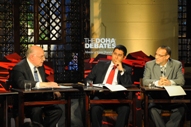 TIM SEBASTIAN
TIM SEBASTIAN
Essam El-Erian.
ESSAM EL-ERIAN
I think that is not a classical revolution. It is time now to hand in power from the military to the civilians. In 1952 the people supported the revolutionary by the army. Now it is time that the army which is supporting the revolution by the people and is now a partner in the revolution, it is time to keep the military in the camps and to defend the country against dangers.
Vote result
TIM SEBASTIAN Okay, all right. Thank you very much. Ladies and gentlemen, we're going to vote on the motion: "This House believes for the sake of democracy, Egypt should postpone elections." Would you please take your voting machines. If you want to vote for the motion, that is the side represented by those on my right, you'll need to press button one in a moment. If you want to vote for those against the motion, represented by those on my left, it's button two. Whichever button you want to press, would you please do it now. You only have to press once. Due to the wonders of modern science, your vote will be sent directly to our computers, and we should have the result for you in about twenty seconds... All right, the figures should be coming up just about now. There we are. We have the results: 84.4 percent for the motion, 15.6 percent against. The motion has been resoundingly carried. All it remains for me to do is to thank our distinguished panellists. Thank you very much indeed for taking part tonight. Thank you to you the audience as well. The Doha Debates will be back again in a few weeks' time. Till then from all of us on the team and from post-revolution Cairo, thank you very much for coming. Good night, thank you.
Okay, all right. Thank you very much. Ladies and gentlemen, we're going to vote on the motion: "This House believes for the sake of democracy, Egypt should postpone elections." Would you please take your voting machines. If you want to vote for the motion, that is the side represented by those on my right, you'll need to press button one in a moment. If you want to vote for those against the motion, represented by those on my left, it's button two. Whichever button you want to press, would you please do it now. You only have to press once. Due to the wonders of modern science, your vote will be sent directly to our computers, and we should have the result for you in about twenty seconds... All right, the figures should be coming up just about now. There we are. We have the results: 84.4 percent for the motion, 15.6 percent against. The motion has been resoundingly carried. All it remains for me to do is to thank our distinguished panellists. Thank you very much indeed for taking part tonight. Thank you to you the audience as well. The Doha Debates will be back again in a few weeks' time. Till then from all of us on the team and from post-revolution Cairo, thank you very much for coming. Good night, thank you.
Watch online

